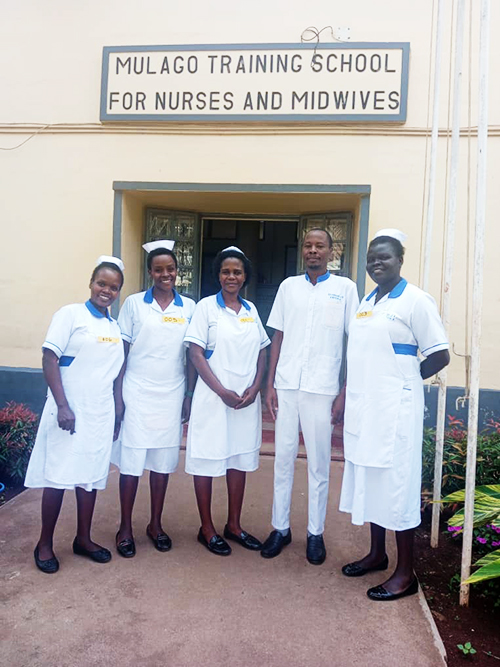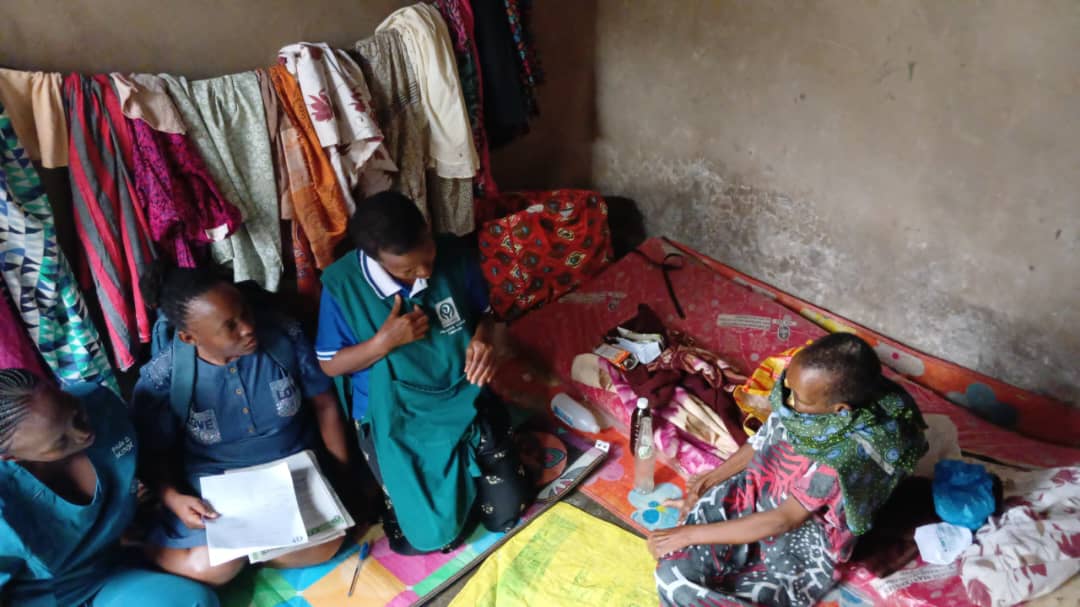PCAU’s Vision for Accessible Palliative Care for All in Uganda
In a country where the need for palliative care continues to grow, the Palliative Care Association of Uganda (PCAU) is strengthening the healthcare system through education, training and workforce development. A key component is the Advanced Diploma in Palliative Care Nursing (ADPCN) program, which is a strategic response to critical workforce gaps in palliative care. This program, supported in part through the CHC – PCAU partnership (notably the nurse training scholarship), is making a meaningful impact on Uganda’s healthcare landscape. In a recent update, PCAU reflected on the ADPCN’s achievements and shared evolving strategies to make palliative care more accessible and integrated across Uganda’s healthcare system by enhancing healthcare provider skills.
 PCAU champions equitable access to palliative care education, particularly for health workers from under-served districts. In January 2025, PCAU awarded 15 scholarships – 11 for the ADPCN program at Mulago School of Nursing and Midwifery and four for the Bachelor of Science in Palliative Care at the Institute of Hospice and Palliative Care in Africa. PCAU’s selection process emphasizes reaching districts with few or no trained palliative care providers. Beyond increasing numbers, PCAU is working to ensure these health workers can help establish palliative care units in their home districts and improve care for people facing life-limiting illnesses. This approach aligns with PCAU’s strategic goal of decentralizing palliative care services and reducing patient dependence on regional referral hospitals, which will bring care closer to communities.
PCAU champions equitable access to palliative care education, particularly for health workers from under-served districts. In January 2025, PCAU awarded 15 scholarships – 11 for the ADPCN program at Mulago School of Nursing and Midwifery and four for the Bachelor of Science in Palliative Care at the Institute of Hospice and Palliative Care in Africa. PCAU’s selection process emphasizes reaching districts with few or no trained palliative care providers. Beyond increasing numbers, PCAU is working to ensure these health workers can help establish palliative care units in their home districts and improve care for people facing life-limiting illnesses. This approach aligns with PCAU’s strategic goal of decentralizing palliative care services and reducing patient dependence on regional referral hospitals, which will bring care closer to communities.
Another recent milestone reflects PCAU’s commitment to lifelong learning: six health workers supported by PCAU successfully graduated with master or science in Palliative Care from IHPCA. This achievement represents more than academic success – it signals PCAU’s ongoing commitment in capacity building and leadership development for Uganda’s palliative care healthcare work force. Graduates with Master’s degree in Palliative Care are equipped to:
- Deliver advanced, compassionate care that alleviates suffering and enhances quality of life for patients and families,
- Integrate palliative care into mainstream health services, addressing the growing demand for specialized care, and
- Contribute to the development of the field through research, education, and policy advocacy.
Their academic journeys, including applied research and leadership training, have prepared them to shape the future of palliative care in Uganda and beyond.
 The transition from classroom learning to clinical practice is a crucial component of healthcare training. PCAU facilitates experiential learning placements where students can engage directly in patient care, observe interdisciplinary teamwork, and internalize the importance of holistic support for individuals with life-limiting illnesses. Recently, 11 ADPCN students were placed at a range of specialized PCAU member palliative care sites, including Hospice Africa Uganda, Kawempe Home Care, the Uganda Cancer Institute, and Mulago’s Palliative Care Unit. The clinical experiences help shape well-rounded practitioners who are capable of delivering person-centered care. PCAU’s commitment to ongoing evaluation ensures these learning environments remain high-quality and responsive to student feedback. Looking ahead, PCAU plans to expand clinical placement opportunities to pediatric settings, including Mulago’s Pediatric Oncology Unit, with the aim of strengthening competencies in child-focused palliative care – an area of growing need in Uganda.
The transition from classroom learning to clinical practice is a crucial component of healthcare training. PCAU facilitates experiential learning placements where students can engage directly in patient care, observe interdisciplinary teamwork, and internalize the importance of holistic support for individuals with life-limiting illnesses. Recently, 11 ADPCN students were placed at a range of specialized PCAU member palliative care sites, including Hospice Africa Uganda, Kawempe Home Care, the Uganda Cancer Institute, and Mulago’s Palliative Care Unit. The clinical experiences help shape well-rounded practitioners who are capable of delivering person-centered care. PCAU’s commitment to ongoing evaluation ensures these learning environments remain high-quality and responsive to student feedback. Looking ahead, PCAU plans to expand clinical placement opportunities to pediatric settings, including Mulago’s Pediatric Oncology Unit, with the aim of strengthening competencies in child-focused palliative care – an area of growing need in Uganda.
This year, PCAU has made a significant stride by launching a regional mentorship model, designed to support health workers beyond the classroom. This innovative approach involves trained champions across Uganda’s five regions providing on-site mentorship, supportive supervision, and follow-up within local health facilities. The regional mentorship model was successfully launched through a formal orientation process, and early outcomes show improved integration of palliative care services, strengthened oversight of new graduates, and embeds palliative care as a standard practice at facility and district levels. A compelling example comes from Bunyangabu District (Western Uganda), where Nurse Paul Birugi, an ADPCN graduate, established a palliative care unit at Kibito Health Centre IV. With mentorship from his regional champion and local district sensitization efforts, Paul and his team now offer essential pain relief and psychosocial support – services that previously required a 327-kilometer (approximately 203-mile) journey to the nearest referral center.
The ADPCN program is more than a scholarship initiative – it is a cornerstone of PCAU’s national vision for a robust, decentralized, and sustainable palliative care workforce. As 2025 progresses, PCAU remains focused on several key priorities among which include:
- Sustaining and expanding scholarship support to grow the pipeline of trained providers.
- Scaling the regional mentorship model, including capacity-building for champions.
- Expanding clinical placement sites with a focus on pediatric and community-based care.
- Deepening partnerships with training institutions and the Ministry of Education and Sports (MoES) to institutionalize the ADPCN program.
- Promoting research initiatives and supporting student-led publications to advance the evidence base for palliative care.
- Exploring opportunities for blended learning models to reach even more health workers in remote and underserved areas.
- Continuing to measure and share impact stories that inspire investment and wider support.
